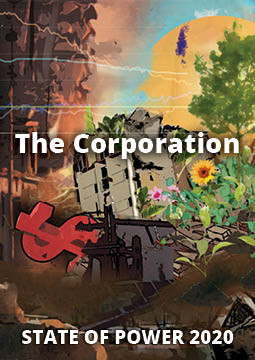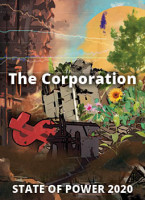Hacking the corporation Artistic interventions against the dark age of permissionless innovation
Topics
Barney Francis, AKA Bill Posters on the nature of corporations, their power and how they shape society.


Jody Harltey
Barney Francis, AKA Bill Posters, is an artist and activist whose work interrogates corporations and power relations that exist in public space and online. He has been involved in many subvertising projects, including one that hackedd 600 ad spaces in Paris in 2015 the day before the UN climate-summit with truth-telling posters. In June 2019, his doctored fake video of Zuckerberg appearing to announce a new dystopian programme, Spectre, became a viral sensation, drawing attention to Facebook’s power and its manipulation and commercialisation of people’s data. Posters is co-founder of Brandalism and Subvertisers International (SI) both of which works to challenge commercial advertising and corporate power in public space.
What experience do you have of working to challenge corporations and their power?
I have been critically interrogating power relationships for over a decade. I try to make network-based interventions that are both collaborative and interdisciplinary and often fairly large in scale. My practice is split over three distinct but intertwined spaces: physical public space, digital space and the media sphere, where I try to interrogate how power intersects and straddles these.
I call them hacks and the idea is for my practice to act as a provocation for myself and others with the hope of finding new public understandings for the social, political and environmental visions and possibilities for life. I use the methodology of early hackers, who interrogated systems and intervened both to question and expand the limits and normal functions of systems.
In terms of interrogating corporations, I have been particularly interested in looking at their ‘persuasion architectures’, in public space these architectures are the billboards, the adverts, the physical monuments to neoliberal capital that normalise and condition us to various forms of power via storytelling and the control of message and meaning in our shared public spaces. In digital space, my practice increasingly involves interrogating the digital infrastructures and architectures created by the broad and complex digital influence industry. Sometimes this translates into both spaces simultaneously, for example critiquing the smart city involves addressing both the symbolic and social aspects of the city as well as the underlying digital infrastructures underpinning emerging forms of total digital surveillance.
I like to do these interventions with others, combining a sort of DIY punk graffiti method that disrupts and subverts together with the principles of DIT – ‘Do It Together’ - collaborative methods learned from social movement organising in order to challenge today’s dominant cultural myths and stories. There is a danger that by acting on your own you can reproduce the same forms of power and privilege that exist solely for the corporation, using for example your access to get into public space but not redistributing that power with others so I pay particular importance to process, not just aesthetic output.
Can you give an example?
Well recently, I have been interrogating and subverting the digital techniques and technologies used to influence peoples behaviours and decision-making in commercial and political contexts. Specifically how the choices we make online and in the voting booth are influenced and manipulated by powerful opaque ‘black box’ technologies and the hidden digital infrastructures of the Digital Influence Industry.
I wanted to use the theory of detournement – the subverting of signs, signifiers and systems - to reveal alternative perceptions of the power relations that exist between multi-national tech companies and their ‘users’ - citizens.
In 2019, working in collaboration with US artist Daniel Howe, we made an immersive installation entitled Spectre, commissioned by Sheffield Documentary Film Festival. We named it after the online persona of Dr. Aleksandr Kogan, the data scientist that sold 87 million Facebook profiles to Cambridge Analytica. Our goal was to make it an immersive installation that detournes many of the technologies and methods used by the Digital Influence Industry. So we used algorithms and visitor’s personal data to reflect on.
psychometric profiling; gamification, ‘deep fake’ technologies; and micro-targeted advertising.
The installation tries to give a material form to the immaterial concept of Dataism, so we created a sculpture in the form of a stone circle, six black monoliths, an altar to this new religious philosophy of Dataism.
As part of the installation, we released a series of our ‘deep fake’ videos of hacked celebrity ‘Influencers’ onto Instagram as a digital intervention. One involved Mark Zuckererg announcing Spectre as a new Facebook programme. Spectre’s simulation reached dizzying heights. The Zuckerberg video went viral leading to global press coverage and unexpected – and contradictory – official responses from Facebook, Instagram and Youtube. The artworks quickly became embroiled in a deeper, global conversation about the power of computational forms of propaganda and the lack of control the new tech companies have over their own surveillance architectures because of inadequate policies and also from ‘moving fast and breaking things’.
If you remember back to June 2019, our digital intervention happened just after Facebook had received many complaints for failing to remove a doctored video of Democratic House Speaker Pelosi. We wanted to test Facebook and Instagram’s policies concerning computational forms of propaganda as we felt that there is a danger that their policy frameworks were completley inadequate. We also wanted to see - would it be one rule for Mark Zuckerberg and another for Congresswoman Pelosi? What our evidence points to is that there was indeed a double standard. In public statements, Facebook and Instagram made out that they had not censored and downgraded our video as their third party factcheckers had marked them as art/satire, but when we dug deeper into the hashtag surfaces that we had linked into our posts, we couldn’t see any of our post at all – for the 12 days of peak virality and global press interest. This seems to show a downgrading and suppression of our critical artworks. Due to the way power operates on their pseudo-public networks, the truth is we will never ever know what happened under their surfaces.
What have you learnt about the nature of the corporation in your work?
I think that it is simply now a mutation of a nation-state. A transnational hybrid nation-state, with no perceived borders. The only borders that contain the modern corporations are the frontiers that they are seeking to exploit. This logic is very much at the core of neo-colonial capital, shaping how capital reproduces itself into different spaces, territories and new frontiers. It always needs new territories and materials to assimilate or homogenise, academics call it a process of ‘capital absorbtion’. It constantly seeks these new spaces and resources to reproduce itself. And it is these new frontiers and digital raw materials that are most interesting to me to interrogate at present.
Of course this notion of frontiers has heavy colonial and neocolonial signifiers, and has been enabled by a neoliberal ideology, the financialisation of all things and systemic deregulation that removed many of the chains, safeguards and restrictions from corporations. What we are seeing in digital spaces are extensions and mutations of neoliberal ideology. There is a great quote in Shoshana Zuboff’s book [The Age of Surveillance Capitalism] where the Google CEO talks of Google’s business model as operating in new territories where the corporation can expand with unrestricted forms of ‘permissionless innovation’.
This quote encapsulates so much about the logic of the modern corporation; corporations are not even asking for anything that states are in control of any more. They are simply taking. It’s why Zuckerberg feels he doesn’t even need to turn up to UK or European Parliament, because in his world power doesn’t operate there any more. It’s why Google – the principle architect of the norms and conditions of surveillance capitalism have been shielded from serious, organised scrutiny at state level. The dependency of all users of their systems and products include not just billions of citizens but most – if not all – nation state governments, their military-industrial, national security and surveillance infrastructures too.
In the past, there were more equal capacities of states and corporations; they were symbiotic in their relationship but power was more traditionally distributed by the nation state. We now have trillion dollar corporations with 90% market dominance, operating across physical and digital spaces that encompass the globe. As an historical comparison, let’s not forget, Standard Oil was broken up when it had something like 26% market share as a ‘dangerous monopoly’. So what we are seeing now are truly unprecedented levels of consolidations of corporate power.
It’s also important to look at this in light of the consequences of 9/11. That historic moment led to the nation state imperative of ‘All the data, all the time’ (this is actually the British state surveillance agency GCHQ’s motto). A perfect symbiosis of corporate imperatives was also emerging at the same time, the time where the foundations of the norms, conditions and logics of surveillance capitalism, at corporations like Google, IBM, Amazon and Facebook et al took root. It created the norms and conditions that perpetuates the pervasive digital panopticon of today and the manic frenzy at the frontier a new gold rush – behavioural data.
As Yuval Noah Harari states, in the last decade and a half, Dataism has emerged with ‘all the hallmarks of a religious philosophy’, where the belief that more data equates to more truth, is steadily replacing human liberalism as a guiding force of our age. As a result, modern philosophers like Byung-Chul Han argue that we are in the midst of a 2nd Enlightenment, where the (ironically) divine belief in the power of statistical measurement and quantification of all things has been enhanced exponentially with new technologies of power and computational capacities. The irony is that corporations today, in their frenzy to capitalise on this new digital gold rush are in many ways creating a mythology concerning Dataism and the power of data, which, ironically, is the anti-thesis of Enlightenment logic.
The combination of dataism and corporate monopolization of new technologies of power and the hierarchies of knowledge that exist in them, is leading to new emerging forms of what I we could call ‘friendly totalitarianism’. It is insidious as the new totalitarians present themselves as friends to guide us and assist us in everyday aspects of the day to day via the renditioning of behavioural data – at scale – from billions of humans around the world. This is a new kind of power, a smarter kind of power that doesn’t control via disciplinary measures or violence but rather via creating the conditions for dependency. This new form of power often uses behavioural psychology techniques that are manipulative and dark in nature such as ‘dark design patterns’ – that keep users engaged and clicking; micro-targetted ‘dark ads’ – that target us with propaganda that is tweaked to our psychological vulnerabilities to trigger specific heuristics; and behavioural profiling – so machines know what we have done, and more importantly: what we may do next as a result.
I think it’s clear that today’s digital corporation poses fundamental threats to our human rights. The right to privacy and a future tense are pretty much non-existent today. And history shows us you can’t have democracy without these fundamental, essential rights.
Why do corporations have so much power?
It’s a complex story, but aside from the domination and violence linked to the emergence of colonial-capitalism hundreds of years ago, I think one key component post industrial revolution is storytelling and the way innate human values were twisted to be subservient to capitalist ideals and imperatives. It takes us back the emergence of the PR industry, under the influence of figures such as Edward Bernays (who coined the term ‘public relations’), with his goal of linking ‘innate human needs and desires to inanimate objects’ by applying the psychoanalytic research of his uncle – Sigman Freud – to commercial markets. A post-WWII revolution in corporate power quickly followed the industrial revolution of the late 19th Century.
More recent research has deepened knowledge on human values and finds we are driven by both intrinsic and extrinsic values. As humans, we all have the same capacities and universal range of values, but it’s the way the logic of capital and it’s glossy, seductive engines – the advertising and marketing industries - promote and normalise specific values that fit the imperatives of capital. Social scientists group human values into 2 broad (and slightly problematic) categories; Intrinsic values are broadly linked to benevolence, collective action and solidarity, and extrinsic values contain values based around status, wealth, power, perception of oneself in the eyes of others.
Corporations have become extremely specialised in exploiting extrinsic values and derive power from this. What psychologists have discovered is that when a particular value set is activated and primed, it diminishes others at the opposite end of the values spectrum. Social scientists call it ‘the seesaw effect’. So in this sense, mass advertising is normalising and priming certain values that support power and capital. It’s why the advertising industry is worth hundreds of billions of dollars annually (It’s also why we love to share ‘status’ updates on Facebook). Mass advertising is an inprecise form of mass-targeting that does work (it wouldn’t be worth 100s of billions if it didn’t’). And these industries with their recent extensions into digital spaces and our psyches via micro-targeting (and soon neuro-targeting) are at the crux of what we face now and how our values and behaviours are being manipulated. How do we get out of this mess, until we normalise and make visible other values – not linked to constant consumerist exchanges - that embody and strengthen the social muscles that can bring about the societal and environmental revolutions that we need in order to avoid unparalleled catastrophe for all forms of life on earth.
The recent rise of the logics of dataism and surveillance capitalism takes this to another level. I think it’s fair to say when power doesn't come into view, it exists without question. You could even say the greater the power the more quietly it works. And with the rise of big tech, we are now seeing increasingly permissive forms of power, in which power sheds it negativity and presents as something entirely different: as freedom. It’s much more efficient as a form of power, because it presents itself as helping people and their lives, so people subordinate themselves to power relations without any external force or subjugation or visible violence. It doesn’t involve repressing or forbidding behaviour but rather on making people completely dependent on the corporation and our behavioural data, and increasingly the entirety of human experience, is ‘willingly’ given as part of the devil’s bargain.
How do corporations exercise this power? How does it shape our society?
I am interested in the field of biopolitics, a term explored by Foucault who looked at how power operates through institutions via the discipline of bodies. If you look at digital surveillance and the digital panopticon, we see how this extends from the physical control of human bodies in the Victorian era to the human psyche, where the goal is now to mine our behavioural data and rendition human experience at scale. This is a species-level experiment that is rapidly shaping societies via automated, machine-led forms of culture.
So corporations are now fascinated in data not only because of what they learn about us and our tendencies but because it also allows machines to infer what we are likely to do next as a result. In other words, they are interested in the vast profits to be made from our ‘behavioural futures’. Massive corporate investment is going into these new emerging markets – behavioural futures markets - with billions of subjects and no oversight at any level – either corporate, nation-state, or civil society.
Google’s mission goal is to get to what their CEO has called ‘absolute certainty’ in relation to our behaviours and the exchange for their clients – the advertisers. Think about that for a second, utilising human experience at scale, to rendition behavioural data on billions of humans, in order to infer – with eventual ‘absolute certainty’ – the likelihood we will buy this or that product, or click on this or that link, or take this or that route with our behaviours. This transgresses so many fundamental human rights – the right to privacy, the right to agency, the right to a future tense. It is an Orwellian proposition but makes 1984 seem like chickenshit. Just look at what is happening in China in relation to their ‘social contract’ programme, similar systems of social and behavioural control are already emerging in the west and global south too. But it’s also nothing new, take a look at the ‘credit score’ system used globally in finance for decades. It’s just another perverse extension of the logic of capitalism.
Currently we are not using any effective tools against these new powerful architectures and automated systems. Talk of transparency is meaningless when you are talking about normalising some technologies, techniques and processes that possibly shouldn’t exist. Some things should not be breathed into existence at all. We must also remember that neurologically, humans are using neolithic hardware against 21st century software. For example, in no way is it ethical for a holiday company like Air BnB to know the same psychological profile information about a human as their psychologist does. It is essentially a form of the unlicensed practice of medicine, at a scale of tens of millions of human subjects.
It’s also important to learn from the past about how the use of data has unexpectedly shaped the future of certain ethnoreligious groups. Civil planners in Amsterdam before World War II did sophisticated mapping of its neighbourhoods to ensure its municipal services calendars worked for different religious and ethnic groups in the city. It helped create a more harmonious city but when Amsterdam was occupied by Germany at the start of World War II, this data was gold-dust for the Nazis who used the same maps to efficiently round-up Jews from specific areas of the city, overnight. The architects of the original data and systems were not the ones in control any more leading to the most disastrous consequences for over 70,000 jewish citizens.
Similarly the architects of today’s new persuasion infrastructure won’t be in charge in 30 years. In the future, as there are mass migrations from equatorial regions for example, how do we stop these new architectures and technologies of power being exercised on the bodies of less privileged, non-white people who really need our solidarity in dealing with the worst of realities? These are serious questions that need to be addressed today.
The truth is that the phenomenon of digital corporate power has already crept up on us without noticing. It was welcomed by nation states and people for the economic and concrete benefits it brought in the aftermath of the 2008 financial crisis . But already, we can see that we have moved in a few years from a time when privacy was a thing, to a time where it is increasingly scarce. Privacy today is a myth and this is not normal.
I have recently been working on trying to find where my memetic and digital selves exist online in an attempt to see where my mimetic self exists now, to try and control my own digital privacy. Going through 200 privacy policies of key apps and tools I use in order to see where inferences of me exist. But there is no way for me today to know where data, in what form, in what machine exists. How do you put the lid on something that has been open-season for 30 years? How do you control something already out of the gates? As the artist James Bridle eloquently states, we are living in ‘a new dark age’ where these new trillion dollar companies are hard at work pillaging ‘a new dark continent’ again.
How does this digital colonisation intersect with the physical injustices wrought by corporations throughout the global South?
While this might appear initially as a Global North issue, it is totally transnational. I am currently doing some research in Kampala, Uganda, where the government has recently installed 3000 facial recognition cameras in the capital which will both uphold the government’s dictatorship and also serve its Chinese investors, who are using the data of images of black faces to improve their facial recognition capacities and algorithms in China. It is in short an example of an emerging form of algorithmic colonialism.
People in countries like Uganda and Brazil are on the sharp end of both traditional forms of power - violence on bodies and physical oppression - and a new type of violence in digital space. So not only are physical and material resources being mined and exploited, but also human experience with even less knowledge about how the data is being used and what experiments are being done with it at population-level scales.
What have been the best techniques or strategies for confronting corporate power and impunity?
What I have tried to do is make network-based interventions that in a small but meaningful way subvert, disrupt and re-democratise power in public and digital spaces, that reveal the dangers of capitalism and unchecked corporate power. I want to work with others to critically interrogate our relationships with forms of power and organise in relation to capital.
The best interventions have been collaborative ones where the process is as important as the outputs. Encouraging and facilitating participation in interventions can be immensely empowering for participants. You create the norms, conditions and values that you want to see more of in the world, even if it’s only for short moments. As participants transgress, for example into advertising spaces, they see how power operates and feel their own power and agency in a fun, easy political way. Only when you transgress the borders and laws that exert power over us do you truly see the coercive forms of control that dictate our everyday reality. That limit our imaginaries. There are also new norms and conditions you can create in creative processes that engage people to strengthen and re-prioritise our intrinsic values.
We experienced that in the ad-hacking campaign we organised prior to the UN COP21 climate summit in Paris in 2015 where we reclaimed 600 ad spaces in one day to challenge the corporate takeover of the climate negotiations. We worked with 100 citizens over 6 weeks to prepare and implement ads exposing the corporate green-washing, to make visible the corporations responsible for the climate crisis and the links between advertising, consumerism and climate change.
On the day of the action, armed police raided our main workshop, spread-eagling team members on the floor, holding us at gunpoint for several hours. It was deeply oppressive and violent. In the consternation afterwards, there was much debate about whether to continue and it was one of the young female participants who inspired us all to go ahead anyway. The project wasn’t ours any more. All the teams installed the artworks in a militarised city centre and the project went on to receive global media coverage and ignite confidence back into the environmental movement that had been shut down in Paris via the state of emergency laws.
What do you think should be the future of the corporation?
The future of the corporation in its current forms has no future. The future of the corporation needs to be determined by the removal of all legal, cultural, political and moral systems of belief that allow the constant externalisation of the social and environmental costs of doing business on earth. Punishable by huge financial and personal levies against those in control of boardroom decision-making and corporate apparatuses. Whilst in many ways we must acknowledge the benefits that some forms of capitalism have brought to wide ranging populations (as a white, male man from England I am one of the most privileged people on earth today because of capitalism and colonial forms of power), but when your corporate lover becomes violent, abusive and a danger to your life and the lives of others, you must end the relationship quickly, and begin again afresh, taking best parts with you and consigning the rest to the fires of Victorian history. We really don’t have time to fuck around any more.
If we look at the modern form, practices and processes of the corporation, we see that it is founded on a belief of ‘othering’, of human power and capitalist logic existing in relation to nature and dominating it, not being a part of it. This logic has deep historic roots, and violence has been enacted especially on black and brown bodies, the flora and fauna, the biosphere for centuries. It is entropic in nature, and the laws of the universe show that it can only exist on borrowed time. It is the law of death.
The modern corporation must rapidly transition (in a matter of a decade) to more harmonious syntropic systems of organisation, energy and resource use. By 2030 the world’s fate will be sealed and the global ambition to limit anthropomorphic temperature rise to 1.5 will be lost forever if current models and forecasts hold true. For corporate culture to become syntropic requires a new understanding of humanity’s deep ecological relationship as part of nature - not superior to it. This will define not just the future of the corporation, but of all life on earth. For the corporation the choice is now a simple one: evolution or death.


